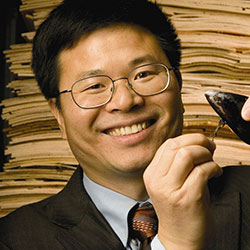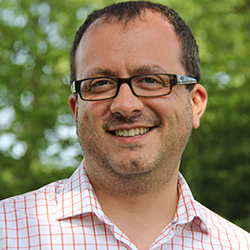 |
 |
 |
|
| |
GC3 Green Chemistry Innovation
Webinar Series
|
 |
Professor Kaichang Li: Successes and Lessons from a Serial Green Chemistry Innovator
Kaichang Li, Professor, Oregon State University
September 17, 2013
Kaichang Li, Professor of Wood Science & Engineering at Oregon State University, observed mussels tenaciously gripping rocks on the Oregon coast, which led to the development and commercialization of a bio-based, formaldehyde-free adhesive for replacement of carcinogenic urea-formaldehyde resins in wood-based composite panels. This adhesive has revolutionized the forest products industry and is a green chemistry success story. Since then, Dr. Li has developed several other commercial products aimed at solving some of the most important and difficult green chemistry challenges. In this webinar we will hear about Dr. Li’s successes and challenges and learn about the opportunities and possible pitfalls of academic/industry innovation, co-development, and commercialization.
|
| |
|
 |
Accelerating Commercialization of Green Chemistry Technologies at GreenCentre Canada
Rui Resendes, Executive Director, GreenCentre Canada
Tuesday, October 8, 2013
Formed in 2009, GreenCentre Canada has an impressive track record of commercializing early stage green chemistry inventions originating from academia and small to mid-sized companies. This green chemistry-focused organization employs a unique business model designed to pull commercially relevant green chemistry ideas out of the lab and into commercial applications. Rui Resendes, Executive Director of the Centre, will walk us through their business model and describe the Centre’s successes, challenges and future directions.
|
| |
|
 |
InnoCentive: Using Crowdsourcing to Solve Green Chemistry Challenges & Create New Market Opportunities
Alph Bingham, Founder & Board Member, InnoCentive
Wednesday, October 23, 2013
As companies seek to develop safer chemicals and materials for use in their products and production processes, some are turning to crowdsourced open innovation “challenges” to create new markets and solve problems more quickly and cost effectively. Challenge driven innovation (CDI) enables organizations to harness diverse and creative on-demand talent when needed and is being readily embraced by commercial enterprises, government agencies, and not-for-profits. Dr. Alph Bingham, Founder & Board Member of InnoCentive, will explain CDI and how it can fit within the broader tapestry of your innovation and R&D efforts, and dive into real examples of how CDI is being applied to solve chemistry and sustainability challenges.
|
| |
|
|

|
Advancing Green Chemistry Innovation in the Pharmaceutical Industry: The GCI Pharmaceutical Roundtable's Research Grant Program
Julie Manley, Guiding Green LLC & Coordinator of the ACS, Green Chemistry Institute's Pharmaceutical Roundtable
Thursday, December 12, 2013
The American Chemical Society (ACS) GCI Pharmaceutical Roundtable began in 2005 as a non-competitive partnership between the ACS Green Chemistry Institute® and pharmaceutical corporations to promote green chemistry & engineering in the global pharmaceutical industry. Today, 15 pharmaceutical – related companies are collaborating through the Roundtable to identify critical, pre-competitive green chemistry & engineering research needs and are pooling their resources to fund university research to meet these needs. In this webinar, Julie Manley, Guiding Green LLC; Roundtable members from Eli Lilly and Pfizer; and researchers from UCLA, U Mass Boston and Michigan State provide an overview of the Roundtable and delve into the grant program, highlighting goals, accomplishments, examples, how they prioritize research, and handle IP.
|
| |
|
Presentation and audio recording from past webinars are now avaliable on the GC3 website. For more information on the work of the GC3, contact GC3Info@greenchemistryandcommerce.org or call 978-934-2997.
|
| |
|
|
